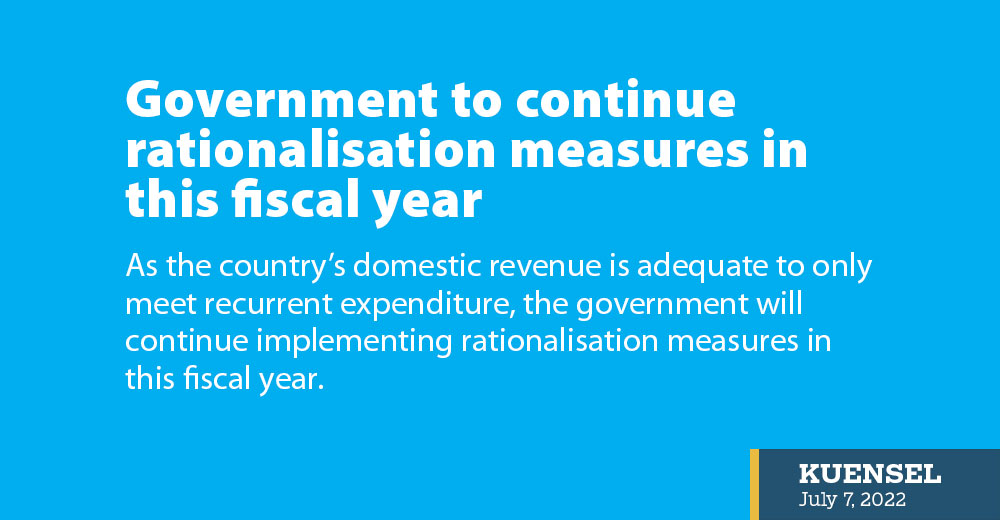Thukten Zangpo
As the country’s domestic revenue is adequate to only meet recurrent expenditure, the government will continue implementing rationalisation measures in this fiscal year.
For the fiscal year, the finance ministry has estimated recurrent expenditure of Nu 36.34 billion (B) from the total expenditure of Nu 74.8B.
Since the recurrent expenditure has to be met through the domestic revenue as mandated by the Constitution, the ministry has estimated a domestic revenue of Nu 37.05B in the fiscal year.
Tax revenue was estimated to contribute to Nu 25.432B, Nu 10.935B from non-tax, and Nu 685.36 million from internal grants.
In the fiscal year, the fiscal deficit was projected at Nu 22.882B, which is 11.25 percent of the gross domestic product.
The deficit would be financed through concessional external borrowings and domestic borrowings.
“It is imperative for all budgetary bodies to take proactive measures to review and spend every amount of monies allocated wisely, exercise prudence with strong financial discipline to avoid cost overruns, unnecessary spending, prevent financial leakages, and drive cost efficiencies and productivity savings in all our expenditures,” the finance ministry stated in the budget notification for the financial year on July 4.
The notification also mentioned the suspension of daily subsistence allowance of Nu 2,000 per day for all in-country travel payments. “However, travel allowance and daily allowance claims are eligible based on the admissibility as per the rules.”
Similarly, the government would also continue the rationalisation measures implemented in the last fiscal year.
The ministry asked to rationalise both ex-country and in-country within the allocated budget.
Hiring of private buildings for office space and new establishments is restricted.
There will be no activation of salary indexation until the revenue performance improves.
Civil servants would not get transfer benefits and the option to monetise vehicle quota would be deferred without affecting the date of the next allotment.
On capital expenditure, the government restricted any new constructions and major renovations of offices, staff quarters, and site development like construction of gates, fencing, and boundary walls.
Agencies cannot procure pool vehicles including replacement, rationalise and restrict training, workshops, seminars, orientation, annual conference, observation of international days, awareness programmes, including hiring of professional services consultants.
The finance ministry also asked the agencies to rationalise and restrict the procurement of furniture, equipment, and computers with exceptions for educational institutions and health facilities.
However, any re-appropriation of the funds under capital expenditure measures can be carried out upon approval from the government or the Cabinet.
The payment of internet charges would be centralised under the Department of Information Technology and Telecom for all budgetary bodies.
The government also strongly advises minimising non-essential imports and prioritising domestically produced materials for works and goods.


